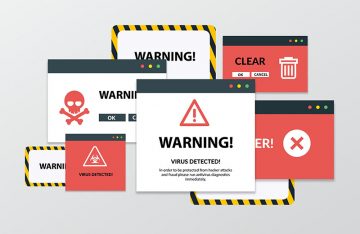'Your version of Windows is out of date' Pop-Up Scam

During our investigation into suspicious websites and their affiliated advertisements, we encountered a site featuring a deceptive pop-up message that falsely claims the Windows operating system is outdated. These types of websites are often created with malicious intent, aiming to extract personal information, solicit money, or promote potentially harmful software.
The pop-up message asserts that the user's Windows version is outdated and suggests that browsing the internet is unsafe as a result. It further states that failure to take immediate action will result in the loss of network connection. The message urges the user to urgently update their system by clicking on the provided link labeled "Update Windows."
Additionally, another message on this site warns about a critical error related to the license key for Ultra_VPN. It notifies the user that the Ultra_VPN license is set to expire within a specified timeframe and cautions that the internet connection will be blocked for security reasons. The message then presents the user with the option to renew the license key at an 80% discount.
This deceptive webpage redirects users to a legitimate page that includes an affiliate's ID in the URL. It appears that this pop-up scam is orchestrated by affiliates seeking to earn illegitimate commissions. It's important to note that the legitimate application being promoted, UltraVPN, is not associated with this scam.
Another crucial aspect of similar scams is that the scammers behind them may attempt to entice unsuspecting visitors into providing remote access to their computers. In such cases, scammers may try to steal sensitive information, extort money, infect computers with malware, or engage in other malicious activities.
Why Should You Never Trust Warnings About Viruses or System Updates You See Online?
You should never trust warnings about viruses or system updates that you see online because they are often used as deceptive tactics by malicious actors to exploit unsuspecting users. Here are the reasons why you should exercise caution and skepticism:
Scare Tactics: Online warnings about viruses or system updates often employ scare tactics to create a sense of urgency and panic. They may claim that your device is infected with numerous viruses or that your system is at risk of crashing if immediate action is not taken. These tactics are designed to pressure you into making hasty decisions without thoroughly evaluating the legitimacy of the warning.
Phishing Attempts: Many warnings about viruses or system updates are actually phishing attempts. They may mimic legitimate notifications from reputable companies or software providers, aiming to trick you into revealing sensitive information such as login credentials, credit card details, or personal data. Falling for these phishing attempts can lead to identity theft, financial loss, or unauthorized access to your accounts.
Malware Distribution: Some warnings about viruses or system updates are disguised as helpful solutions, encouraging you to download and install software or updates from unverified sources. In reality, these downloads may contain malware, ransomware, or other malicious programs that can infect your device, compromise your data, or grant unauthorized access to cybercriminals.
Fake Updates: Cybercriminals often create fake system update alerts that mimic the appearance of legitimate updates from operating systems or software providers. Clicking on these fake update prompts can lead to the installation of malicious software or unauthorized modifications to your system, which can result in compromised security and stability.
Manipulation of Trustworthy Brands: Malicious actors may exploit the reputation and trust associated with well-known brands or antivirus software by presenting fake warnings that claim to originate from these trusted sources. They aim to deceive users into believing that the warning is genuine and that immediate action is required. However, legitimate companies typically provide system updates and virus alerts through official channels, such as their software interfaces or official websites, rather than random online pop-ups.
To protect yourself, it is essential to rely on trusted sources for virus alerts and system updates. Only download software or updates from reputable sources, such as official websites or app stores. Be cautious of unsolicited warnings you encounter online and verify their authenticity by cross-referencing information with official sources or contacting the relevant software provider or support team. Additionally, maintaining up-to-date antivirus software and practicing safe browsing habits can help mitigate the risks associated with online threats.








